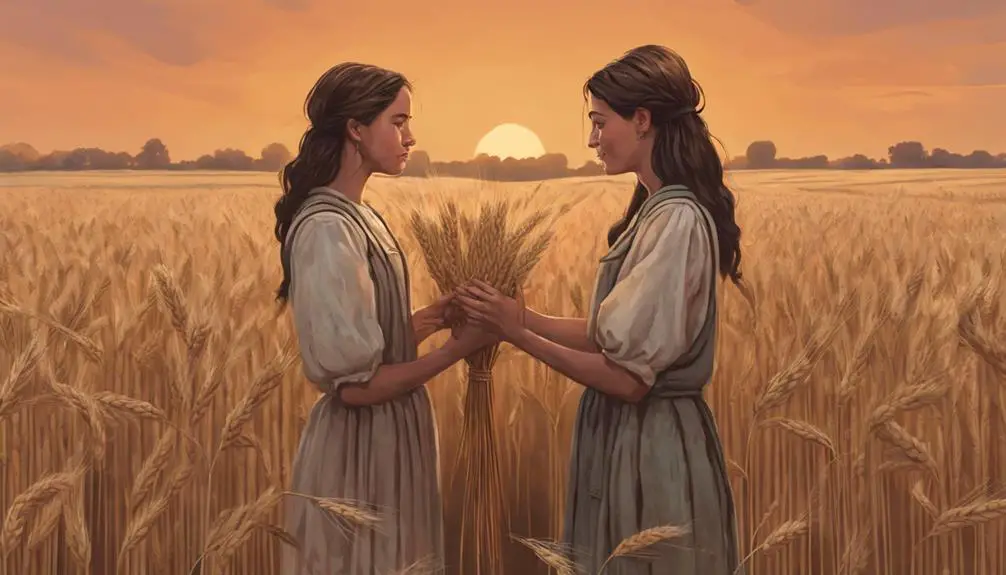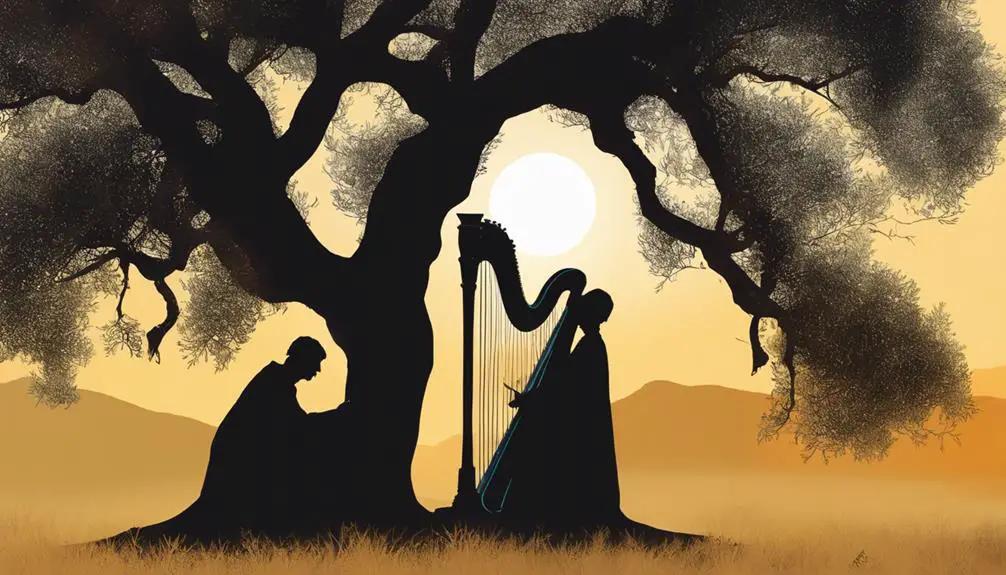Plunge into the heart of biblical narratives to uncover tales of devotion, sacrifice, and the profound love stories that shaped history.

Stories in the Bible About Love
You might not be aware, but the Bible isn't just a collection of religious doctrines; it's also a treasure trove of profound love stories that rival any modern romance novel. From the unwavering loyalty of Ruth to Naomi, transcending familial ties, to Jacob's years of labor for Rachel's hand, these narratives offer a glimpse into the multifaceted nature of love. The sacrifices of Abraham and the deep friendship between David and Jonathan further illustrate love's power and complexity.
But it's the overarching theme of God's love for humanity that ties these stories together, showcasing a love so vast it's worth exploring further. Curious about how these ancient tales can still resonate today? Let's take a closer look at the timeless lessons they offer.
Key Takeaways
- The Bible showcases love through enduring relationships, like Ruth and Naomi's devotion and Jacob's love for Rachel.
- Divine love in the Bible is characterized by forgiveness, compassion, and a readiness to restore humanity.
- God's unconditional acceptance is demonstrated through Jesus's sacrifice, emphasizing grace over human merit.
- Biblical stories highlight God's covenant relationship, marked by unwavering faithfulness and deep commitment to His people.
The Love of Ruth and Naomi

The story of Ruth and Naomi exemplifies loyalty, showcasing how steadfast love can transcend familial boundaries and societal expectations. It's a narrative deeply embedded in the context of cross-cultural loyalty and familial devotion, providing a rich tapestry for understanding the complexities of human relationships within the biblical framework. Ruth, a Moabite woman, pledges unwavering loyalty to Naomi, her Israelite mother-in-law, in the face of shared tragedy. This act of commitment not only defies cultural norms but also highlights a profound sense of duty and affection that transcends genetic ties.
Your analysis of this story might reveal the nuanced layers of Ruth's decision. It wasn't merely a vow of support; it was a declaration of solidarity that bridged two distinct cultures. This cross-cultural loyalty challenges the contemporary understanding of familial and societal obligations, suggesting a broader, more inclusive definition of family.
Furthermore, Ruth's actions speak to a deep-seated familial devotion. By choosing to stay with Naomi over returning to her people, Ruth embodies a loyalty that goes beyond conventional expectations. This narrative arc serves as a testament to the strength of chosen family ties, particularly in times of adversity.
In a scholarly context, Ruth and Naomi's story underscores the transformative power of love and loyalty. It invites a reevaluation of the boundaries of kinship and the potential for cross-cultural alliances. Their journey from loss to redemption, facilitated by unwavering support for one another, offers a timeless lesson on the essence of familial devotion and the capacity of human beings to forge profound connections across seemingly insurmountable divides.
Jacob's Devotion to Rachel

Analyzing Jacob's unwavering commitment to Rachel, we uncover a narrative that stretches the boundaries of love and devotion within the ancient context of biblical relationships. This story, rich in themes of perseverance and fidelity, is emblematic of the profound connections that can be forged in the face of adversity.
Jacob's love for Rachel is immediate and profound. Upon meeting her, he is so moved that he weeps, a testament to the depth of his feelings. This emotional response sets the stage for what becomes a legendary tale of love and dedication. The centerpiece of this narrative is Jacob's agreement to work for Rachel's father, Laban, for seven years to win her hand in marriage.
Aspect of Jacob's Devotion |
Analysis |
|---|---|
Immediate Love |
Jacob's instant affection for Rachel signifies a deep, soulful connection. |
Seven Years' Wait |
His willingness to labor for seven years underlines his steadfast commitment and patience. |
Laban's Deception |
Jacob's endurance of Laban's deceit highlights his resilience in the face of betrayal. |
Second Seven-Year Term |
His agreement to yet another seven years of work, even after being deceived, underscores the unwavering depth of his love. |
This tale is not just about the hurdles Jacob overcomes but also about the societal and familial dynamics at play. Laban's deception, a pivotal point in the narrative, serves as a harsh test of Jacob's devotion. Despite this betrayal, Jacob's commitment does not waver, illustrating his profound love and dedication to Rachel. This story, set within a complex web of relationships and obligations, showcases the enduring power of love to overcome obstacles.
The Sacrifice of Abraham

In this exploration of Abraham's trial, we confront a narrative that tests the very fabric of faith and obedience through the lens of a father's ultimate sacrifice. Abraham's unwavering commitment to God, even when asked to sacrifice his son Isaac, provides a profound study in the dimensions of biblical love—not just familial love but also the love between God and His followers. This story, rich in symbolism and theological depth, serves as a cornerstone for understanding the complexities of faith and obedience in the face of unimaginable decisions.
- Faith tested: Abraham's trial is emblematic of the testing of faith. Asked to sacrifice what he holds dearest, Abraham proceeds, illustrating the depth of his faith in God's righteousness and sovereignty.
- Obedience exemplified: The narrative underscores a model of obedience that transcends human understanding. Abraham's readiness to obey, without question, highlights a surrender to divine will that's both challenging and instructive.
- Divine intervention: At the moment of ultimate sacrifice, God intervenes, providing a ram as a substitute for Isaac. This act not only spares Isaac but also reinforces the notion that God's demands, while seemingly inscrutable, are always within a framework of love and mercy.
- Legacy of trust: The story leaves a legacy of trust in divine promises, showcasing how true obedience is rewarded and how faith, when tested, can emerge stronger.
Through Abraham's ordeal, we're invited to reflect on the essence of our faith and the extent of our obedience. This narrative, while ancient, continues to speak to the complexities of love, faith, and sacrifice in human relations and divine command.
David and Jonathan's Friendship

Reflecting on Abraham's profound faith and obedience, we now explore another dimension of biblical love through the enduring friendship of David and Jonathan. This narrative, deeply rooted in the texts of Samuel, presents a compelling study of how loyalty and unspoken bonds are tested amidst political turmoil and personal strife.
David and Jonathan's friendship emerges in the context of Jonathan's father, King Saul's, increasing hostility towards David. Despite the potential threat to his succession, Jonathan's allegiance to David underscores a loyalty that transcends familial ties and political ambitions. This bond is marked by a series of covenants, where Jonathan recognizes David's future as king and commits himself to David's wellbeing, even at great personal risk.
The depth of their friendship is further evidenced by their emotional partings and Jonathan's efforts to protect David from Saul's wrath. These instances reveal a loyalty tested not only by external pressures but by the potential for personal loss. Jonathan's actions, driven by an unspoken bond, underscore a sacrificial love that prioritizes the other's safety and success over one's aspirations and security.
Analyzing this relationship within its biblical and historical contexts reveals its significance as an exemplar of platonic love and loyalty. Unlike the covenantal love between God and humanity, which is characterized by divine commitment and grace, David and Jonathan's friendship emphasizes human agency in sustaining relationships through trials. Their story invites reflection on the nature of friendship, loyalty, and the sacrifices entailed in upholding these virtues amidst life's challenges.
God's Love for Humanity

Exploring the vast narratives of the Bible, one uncovers the profound and unconditional love God has for humanity, a central theme that resonates through both the Old and New Testaments. This divine love isn't just a backdrop but the very essence of the biblical message, offering insight into the nature of God's relationship with people. It's a love characterized by divine compassion and unconditional acceptance, transcending human understanding.
- Divine Compassion: Throughout the Bible, God's compassion is evident in His willingness to forgive and restore. Despite humanity's repeated failures, God continually offers redemption, showcasing His deep love and mercy.
- Unconditional Acceptance: God's acceptance of humanity isn't based on merit but on His grace. This is most vividly displayed in the sacrifice of Jesus Christ, which bridges the gap between humanity's imperfection and God's perfection.
- Covenant Relationship: The Bible describes a God who enters into a covenant with His people, signifying a deep, enduring commitment. This covenant is a testament to God's unwavering love and faithfulness, despite human inconsistency.
- Parental Affection: God's love is often depicted in terms of parental affection, illustrating a nurturing and protective aspect. This imagery helps believers understand the depth and permanence of God's love for them.
In examining these facets of God's love for humanity, it becomes clear that the biblical narrative is deeply imbued with themes of divine compassion and unconditional acceptance. This narrative invites readers to reflect on the magnitude of God's love and its implications for their lives.
Frequently Asked Questions
How Do the Concepts of Love in These Biblical Stories Compare to Modern Understandings of Romantic and Familial Love?
When you explore love definitions in biblical stories and compare them to modern parallels, you'll find intriguing overlaps and differences. Biblically, love often intertwines with duty, sacrifice, and divine commandments, highlighting a deep, selfless nature.
In contrast, today's romantic and familial love also embraces these values but tends to emphasize personal fulfillment and emotional connections more. This shift reflects broader societal changes in how love's importance and expression are understood and valued.
Are There Any Examples of Unrequited Love in the Bible, and How Are They Resolved or Addressed?
You're asking if the Bible narrates instances of unrequited desires and their resolutions or addresses them.
Indeed, it does. While not always explicitly framed as modern romantic narratives, you'll find stories that touch on unreciprocated affections and the paths toward resolution they embark upon.
These accounts offer profound insights, contrasting and sometimes aligning with contemporary views on romantic resolutions, showcasing the timeless complexity of human emotions and the pursuit of mutual love.
How Does the Cultural Context of the Time Influence the Portrayal of Love in These Biblical Narratives?
Peeling back the layers of history, you'll find that cultural preservation and societal norms heavily shape narratives. When exploring how these elements influence stories, it's clear that the context of the era acts as a lens, coloring perceptions and portrayals.
This analytical dive reveals that the depiction of themes, such as love, isn't just a reflection of the characters' feelings but also a mirror to the societal values and cultural fabric of their time.
What Lessons Can Contemporary Societies Learn About Forgiveness and Reconciliation From the Love Stories in the Bible?
You can learn vital lessons on forgiveness and reconciliation by examining historical narratives, even without directly referencing biblical texts. These stories often intertwine Divine Mercy with Societal Justice, offering a blueprint for contemporary societies.
How Are the Themes of Sacrifice and Love Intertwined in These Stories, and What Implications Do They Have for Personal Relationships Today?
In analyzing themes of sacrifice and love, it's evident they're deeply connected, reflecting divine commandments and love manifestations. This intertwining has significant implications for personal relationships today.
Sacrifice often acts as a testament to the depth of one's love, mirroring higher principles taught in religious texts. Understanding this can guide you in nurturing relationships that are both meaningful and enduring, emphasizing the importance of selflessness and compassion in strengthening bonds.
Conclusion
As you've journeyed through these poignant tales of love, consider the story of the mustard seed, a metaphor Jesus used to illustrate faith's growth from the smallest beginnings.
Just like that tiny seed, the acts of love depicted—between Ruth and Naomi, Jacob and Rachel, within Abraham's sacrifice, and in the friendship of David and Jonathan—blossom into profound testaments to love's enduring strength.
They remind us that love, in its many forms, is a foundational pillar of both human and divine connection.



Sign up